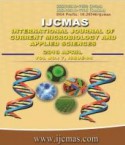


 National Academy of Agricultural Sciences (NAAS)
National Academy of Agricultural Sciences (NAAS)

|
PRINT ISSN : 2319-7692
Online ISSN : 2319-7706 Issues : 12 per year Publisher : Excellent Publishers Email : editorijcmas@gmail.com / submit@ijcmas.com Editor-in-chief: Dr.M.Prakash Index Copernicus ICV 2018: 95.39 NAAS RATING 2020: 5.38 |
To study the effect of dietary supplementation of amla fruit powder on intestinal microbiota of broiler chicken, 300 commercial broiler chicks were randomly distributed into six treatments having five replicates consisting of ten birds each. The chicks fed with standard basal diet in two different growth phases i.e. starter (0-28d) and finisher (29-42 d). The first group was kept as control (T1) and given the basal diet without antibiotic, while second group (T2) was given basal diet with antibiotic. In third (T3), fourth (T4), fifth (T5) and sixth (T6) groups, basal diet was supplemented with amla fruit powder @0.25%, 0.50%, 0.75% and 1%, respectively. The birds were weighed fortnightly to calculate performance parameters viz. feed intake, body weight change and FCR. Then one bird from each replicate was slaughtered and ileal contents were collected aseptically and serially diluted upto six dilutions and 0.1 ml of each dilution was poured and spread uniformly on MacConkey lactose agar for E. coli and MRS for lactobacilli and incubated at 37ºC for 24 hours. The average number of colonies was multiplied by reciprocal of the dilution factor and expressed as log Cfu/g of contents. Due to supplementation of phytogenic feed additive microbial load of gram negative E. coli decreased and beneficial gram positive Lactobacilli increased significantly at higher level of amla supplementation as compare to control group. Feeding diets containing phytobiotics may result in inhibition of growth and colonization of entero-pathogenic microbes in the digestive tract and favours growth of beneficial bacteria i.e. Lactobacilli, thus contributing to the balance of gut microflora.
 |
 |
 |
 |
 |